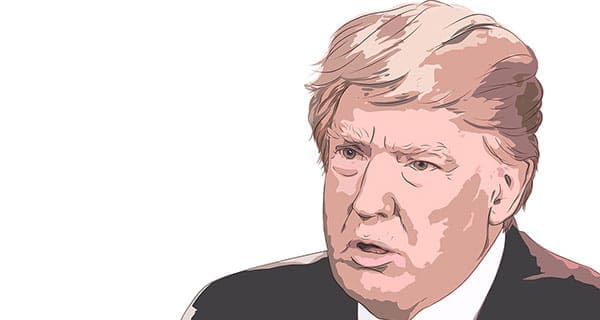 The core of U.S. presidential candidate Donald Trump’s political message is his assertion that the United States “doesn’t win anymore,” because weak-willed politicians have made “bad deals” allowing both its allies and enemies to take advantage of the U.S.
The core of U.S. presidential candidate Donald Trump’s political message is his assertion that the United States “doesn’t win anymore,” because weak-willed politicians have made “bad deals” allowing both its allies and enemies to take advantage of the U.S.
The U.S.’s allies have not paid their share of defence costs, instead getting a free ride, he contends.
Mexico, in particular, has been singled out for also being the source of millions of illegal immigrants, being the primary conduit for illegal narcotics entering the United States and “stealing” high paying American jobs.
When it comes to Canada, Trump has been strangely silent. Perhaps he doesn’t want to disrupt his real estate holdings in Toronto and Vancouver?
Canada, however, largely parallels Mexico’s role in North America’s economy. Both countries send the bulk of their exports to the U.S., roughly 75 percent for Canada, and more than 80 percent for Mexico. They both ran significant trade surpluses with the U.S. in 2014, about $50 billion for Canada and $120 billion for Mexico, although Canada’s has been steadily dropping since then. Both countries export a significant share of their commodity production, especially hydrocarbons, to the U.S., and both also have an extensive manufacturing sector that competes with U.S. industry.
There are, of course, differences. There aren’t millions of illegal Canadian immigrants living in the U.S. or attempting to sneak across the border. The weekend lines of Canadian shoppers at the U.S. border may feel that way, but they all go home after spending their money.
Canadian tourists in the U.S. outspent their American counterparts in Canada by $14 billion in 2014. It’s an amazing figure when you consider that the U.S. has 10 times Canada’s population. Much of the trade surplus is eaten up by significant deficits in services and investment income.
Like Mexico, Canada is also a conduit for drugs to the U.S. If British Columbia ever legalizes marijuana, its cannabis exports would be recognized as its leading export sector, adding billions of dollars to Canada’s official trade.
Nor does Canada pose much of a threat to U.S. manufacturers. According to the U.S. Bureau of Labor Statistics, the average manufacturing wage for U.S. workers is about $26.61 per hour. Statistics Canada has the comparable Canadian wage at $26.90. In Mexico, the average manufacturing wage is around $4.10 per hour.
In the Trumpian worldview, Canada has certainly gotten a “free ride” on defence spending. The other cases of “free riders” that Trump singled out, however, did not represent existential threats to the U.S. NATO may have been designed to protect western Europe from a Soviet invasion, but today’s mission is largely that of protecting the former Soviet satellite states from Russian aggression. Such aggression, while a political defeat for Washington, would hardly pose an existential threat to the U.S. Ditto for South Korea and Japan.
Threats to Canada’s security, however unlikely, do pose a threat to the U.S. Fortifying and defending a 5,000-kilometre-long border would be a Herculean task. Military planners are tasked with considering the unthinkable and planning for the improbable, hence the security of Canada is as much a U.S. concern as it is a Canadian one. No Canadian “free rider” argument is likely out of a Trump White House.
A Trump administration would be supportive of the Keystone XL pipeline, good news for Calgary’s oil patch. In other areas its impact is unclear. Disputes between Ottawa and Washington usually revolve around questions of unfair trade competition. Should one arise, look for Trump, and his trademark belligerency, to be much more assertive at insisting that the U.S. gets “a good deal.”
It’s in the Arctic where a Trump White House is likely to clash with Ottawa. Regardless of its underlying causes, the Arctic is heating up and that has long-term geopolitical implications. There may be significant hydrocarbon deposits on the Arctic seafloor. In addition, transit rights for commercial and military vessels are also at stake.
Russia has moved aggressively to stake a broader claim to the Arctic’s potential mineral wealth and is expanding its fleet of military icebreakers. The U.S. is following suit. Washington has already argued that Arctic waters are international sea lanes and do not require Ottawa’s permission to transit. Such claims are a direct challenge to Canada’s Arctic sovereignty and could bring a very public clash between Ottawa and a Trump presidency.
Trumpism will have mixed consequences for Canada. On the whole, though, Trump has ignored Canada because he simply doesn’t see Canada as much of an economic threat to the United States. In a world where economic competitiveness is increasingly the key to national power, that should give Canadians something to ponder.
Joseph Micallef is a historian, best-selling author and, at times, sardonic commentator on world politics.
Joseph is a Troy Media contributor. Why aren’t you?
The views, opinions and positions expressed by columnists and contributors are the author’s alone. They do not inherently or expressly reflect the views, opinions and/or positions of our publication.


